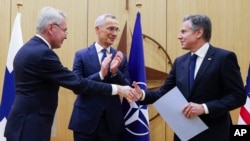In an interview with Romania’s Agerpres news agency published April 6, NATO Deputy Secretary General Mircea Geoana said that NATO is ready for closer cooperation with Moldova.
“We are willing to go as far as the Republic of Moldova is willing to go in its relationship with us,” he said.
Commenting on Geoana’s statement about Moldova, Russian Foreign Ministry spokeswoman Maria Zakharova said April 10 that joining NATO is like neo-colonial dependence:
“[R]approchement with NATO is fraught with the loss of sovereignty, and the unrestrained expansion of the alliance is nothing more than a continuation of the neo-colonial traditions of the West, which do not take into account either the internal political characteristics of states or the centuries-old established ties with their neighbors."
That is false.
The term “neocolonialism,” first used by the French Marxist philosopher Jean-Paul Sartre in 1964, sought to explain the continued dependence of former African, Latin American and Asian colonies on their erstwhile European metropoles. The following year Ghanaian President Kwame Nkrumah used that term in his book titled “Neo-Colonialism, the Last Stage of Imperialism.”
Marxists and other theorists saw “neocolonialism” as a system under which developed European countries and corporations subjugated and exploited their undeveloped former colonies.
Per Encyclopedia Britannica, “The term is now an unambiguously negative one that is widely used to refer to a form of global power in which transnational corporations and global and multilateral institutions combine to perpetuate colonial forms of exploitation of developing countries.”
It adds that under neocolonialism, developed countries blocked growth in developing countries in order to keep them as sources of cheap raw materials and cheap labor.
In contrast, the North Atlantic Treaty Organization (NATO) is a voluntary military alliance between 31 European and North American countries. It was founded April 4, 1949, during the Cold War, and was directed primarily against the perceived military threat presented by the Soviet Union.
NATO is a collective security system, under which its member countries have agreed to protect each other from attacks by third parties:
“NATO is committed to the principle that an attack against one or several of its members is considered as an attack against all. This is the principle of collective defense, which is enshrined in Article 5 of the Washington Treaty.”
NATO’s decisions are made based on a consensus of all 31 member countries:
“When a ‘NATO decision’ is announced, it is therefore the expression of the collective will of all the sovereign states that are members of the Alliance.
This principle of consensus is applied at every committee level, which implies that all NATO decisions are collective decisions made by its member countries.”
According to NATO’s 1995 “Study on Enlargement,” the end of the Cold War presented a unique opportunity to use the alliance’s expansion to strengthen Euro-Atlantic security “by encouraging and supporting democratic reforms, including the establishment of civilian and democratic control over military forces.”
Countries seeking to join NATO, according to the study, would have to meet the following requirements:
- “a functioning democratic political system based on a market economy;
- the fair treatment of minority populations;
- a commitment to the peaceful resolution of conflicts;
- the ability and willingness to make a military contribution to NATO operations; and
- a commitment to democratic civil-military relations and institutional structures.”
In 1997, the U.S. State Department said that the minimum requirements for NATO membership included upholding democracy, “making progress toward a market economy” and keeping the military “under firm civilian control.”
As a result of nine rounds of enlargement since 1949, NATO’s membership has increased from 12 to 31 countries.
Following Russia’s full-scale invasion of Ukraine in February 2022, Finland applied to join NATO. On April 4, 2023, it became the latest country to join the alliance. Asked what he would say to Russian President Vladimir Putin about his country’s bid to join NATO, Finnish President Sauli Niinisto responded: “You caused this. Look in the mirror.”





